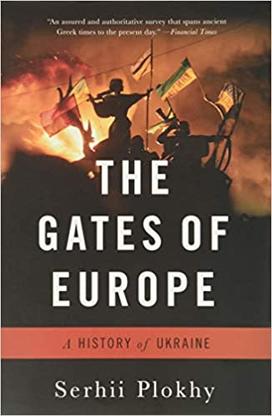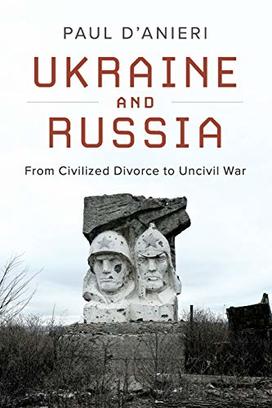Professor Mark Beissinger on Understanding the Conflict in Ukraine
Politics professor Mark R. Beissinger has long specialized in the topics now under international scrutiny as Russia invades Ukraine, with his scholarship covering revolutions and nationalism in the Soviet Union and post-Soviet states. He has written five books on these subjects, including Historical Legacies of Communism in Russia and Eastern Europe, published in 2014. His latest book, The Revolutionary City: Urbanization and the Global Transformation of Rebellion, is due out in April.
PAW asked Beissinger to recommend three books to help readers understand the present conflict, and he suggested these.

The Gates of Europe: A History of Ukraine
By Serhii Plokhy
Conflicting interpretations of the past stand at the center of Russia’s attack on Ukraine, and this is the most authoritative work available on that history. Covering roughly the millennium from the Viking princes to Ukrainian independence, Plokhy weaves a nuanced story of the making of a country situated on the western edge of the steppes and the eastern edge of Europe that is repeatedly contested over by neighboring empires, each of which has left its marks on Ukraine’s regions, as well as a bloody trail in its wake. Sadly, these same forces are playing themselves out once again in the current invasion.

Ukraine and Russia: From Civilized Divorce to Uncivil War
By Paul D’Anieri
For those interested in learning about the international and domestic origins of the war, D’Anieri’s straightforward account of Russian-Ukrainian encounters after independence and the conflict in the Donbas is a good place to start. Rather than focus on personalities, D’Anieri instead emphasizes the inexorable confrontation between two larger forces: European enlargement and democratization in Eastern Europe, and Russia’s desire to retain its “great power” status and domination over its immediate neighborhood. He shows not only how and why these conflicting forces have produced widespread bloodshed on Europe’s edge, but also the ways in which domestic politics in both Ukraine and Russia has been intimately intertwined with these struggles.

By Serhiy Zhadan
This dark and gritty tale of the war in Donbas by one of Ukraine’s leading writers conveys the story of Pasha, a schoolteacher who sets out to retrieve his nephew from an orphanage as war encroaches on his Ukrainian city. Ukraine is the obvious metaphorical orphan, abandoned to its own devices to eke out its survival. The Orphanage provides a taste of the madness of war in Ukrainian cities and the lives ripped apart by the Russian invasion today. As Pasha reflects, “You had to wind up here, in the middle of hell, to feel how much you had and how much you’ve lost.”












2 Responses
Norman Ravitch *62
3 Years AgoOn ‘The Gates of Europe’
It pains me to say anything negative about this book by a Harvard scholar of Ukrainian history. But having finally read The Gates of Europe: A History of Ukraine, by Serhii Plokhy, I must express some criticism. Praise for the book is evident because it provides a necessary review of the history of what became Ukraine over two thousand years. Yet the author never quite resolved the question whether the book was to be entirely scholarly or entirely for the general reader. He does both and thereby fails to some extent. The content is confusing, difficult, useful to be sure, very sure, but hard to follow as some lines are very much that of a scholar writing for scholars and other lines are generalizations for the ordinary reader. The author is very fair when dealing with some embarrassing events in Ukraine, much fairer than even I expected, but the book will never be widely read, I am afraid.
Norman Ravitch *62
3 Years AgoHistory As It Really Is
I am waiting for my copy of The Gates of Europe by Serhii Plokhy and I have not read the other two books. But from what I know about the current war in Ukraine I believe it to be a perfect starting point for all discussions of what history is and is not.
Vladimir Putin has, in a long speech, outlined his history of Russia and the smaller role of Ukraine. Those who are on the other side have simply reversed the evidence to show that Ukraine has always, from the start, been the real Rus and the Mucovites very unimportant until they took the role of changing history in their favor. Minor Rus became Russia and Ukraine, divided between Poles, Tatars, Ottomans, and others.
Each interpretation can be defended up to a point. But interpretation is the point. The evidence is mixed and what is true at the start of the story is no longer true in later times. So Putin and Volodymyr Zelenskyy can both be right and wrong, and the people of Ukraine consists of people with both interpretations. So those who want to learn from history must first understand what they might learn and why the facts so called will not give them a clear lesson. One must in fact place an interpretation first upon the so-called facts in order to get any satisfactory lesson — and the lesson will be subjective not objective. This is obvious to all historians but a mystery to laymen who think they want to understand history with ease. Everything we think we know about most things are partial, clouded, imperfect, and the source of conflict.